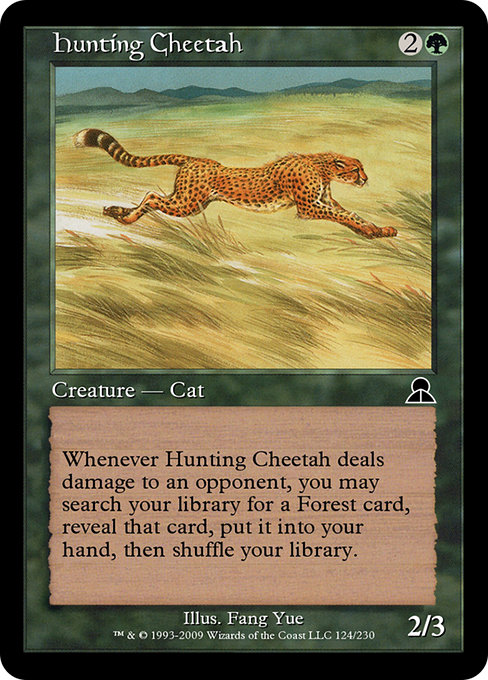
Image courtesy of Scryfall.com
Ethics of Speculation in MTG Finance
In the world of Magic: The Gathering, speculation isn’t just about crunching numbers and chasing breakout cards—it’s about how those choices ripple through a living, breathing gaming community 🧙♂️. The practice sits at the intersection of passion, strategy, and responsibility. When a green creature like Hunting Cheetah from Masters Edition III hits the table, it’s a perfect lens for exploring what it means to invest, collect, and play with care. This 3/2 cat with a {2}{G} mana cost may seem modest, but its trigger—“Whenever this creature deals damage to an opponent, you may search your library for a Forest card, reveal that card, put it into your hand, then shuffle”—offers a micro-lesson in the power and pitfalls of market dynamics in MTG ⛳️🔥.
That ability gives Hunting Cheetah a form of ramp that’s almost polite by modern standards. Not a mana dork in the classic sense, it rewards aggression with card advantage in the form of a future Forest. In a green-based strategy, this can accelerate you toward more land drops, snowballing into bigger plays a turn or two earlier than your opponent expects. Yet the payoff is not just about tempo; it’s about access. Forests unlock more Green, more lands, more forts for casting big threats. The card’s reprint as part of Masters Edition III situates it in a curious space: you have a nostalgic, early-blooming ramp mechanic that’s accessible in Legacy and Commander, but not in Standard. That nuance—format legality and perceived scarcity—feeds the ethical conversation around speculation and price movement 🧩🎯.
Ethical speculators ask: Am I contributing to a healthier, more inclusive scene, or am I inflating prices in ways that price out players who want to build a deck for Friday night at the store? The answer isn’t black-and-white. On one hand, thoughtful investment can help stabilize supply, encourage secondary markets to fund store events, and provide liquidity for casual players who want to trade up rather than drop hundreds at once. On the other hand, outsized leverage—buying up stock to resell at a premium—can create artificial scarcity and stress the social fabric of play groups. It’s a balance act, much like green’s own philosophy: accumulate enough growth to sustain momentum, but never at the expense of the ecosystem we all share 🧙♂️💎.
“Speculation, when done with transparency and care, can be a tool for a healthier market. When it becomes hoarding, it chips away at access and community.”
To ground this discussion in practical terms, consider how Hunting Cheetah fits into a broader strategy. It’s a common creature with a modest body that becomes meaningful through its triggered ability. In a deck that wants to push early damage and maximize value from every draw, you’re looking at a tempo-or-green-midrange plan that uses the forest fetch as a bridge to more perpetual advantage. The card’s rarity and the Masters Edition III provenance also remind us that not all powerful tools come with a high price tag. Some staples are humble, and their real value lies in how they enable players to glue together synergy, not in the brief headlines of price spikes 🧲⚔️.
When thinking about the ethics of MTG finance, it helps to adopt a few guiding practices. First, set a personal budget for speculative purchases—treat it like buying a deck box or a playmat, not a lottery ticket. Second, support your local game store and community by trading with fellow players and avoiding “buyouts” that yank copies off shelves for profit. Third, be mindful of reprint risk and format viability; a card can rise and fall with the tides of design, not just with the whim of a flipper. Finally, share knowledge. If you’re learning, help others learn as well. The MTG community thrives when information flows freely and fairly 🧠🎲.
Hunting Cheetah also offers a small cautionary tale about value and design. Its presence in ME3 is a nod to the era’s experimentation with reprints to make powerful effects more accessible, while maintaining the vibe of the original set. For players, that translates into a reminder: value isn’t solely monetary. It’s the value of a card’s contribution to a deck, to a game night, or to a memory of a tense moment where a forest fetch became the next big play. In the long arc of MTG’s history, these are the moments that keep the hobby vibrant, even as prices dance around the edges of the table 🧙♂️🎨.
As you navigate the intersection of finance and fandom, the product behind the hobby can also reflect that balanced approach. For those long drafting sessions or late-night strategy conversations, a reliable, comfortable desk companion can make the difference between fatigue and focus. If you’re looking for a practical complement to your MTG sessions, we’ve got you covered with a quality surface that won’t break the bank or the vibe. Neons and neon-inspired accessories keep the table lively, while staying quietly functional for those precise mana taps and hot-dog-dodging dice rolls ⚔️💎.
In the end, the ethics of MTG finance isn’t a rigid doctrine; it’s a living conversation about how best to nurture a hobby that rewards curiosity, generosity, and strategic thinking. Hunting Cheetah serves as a spark for that dialogue: a green creature that rewards damage with dry, late-game tutor power, reminding us that the real treasure is not just the card or the price tag—it's the shared experience of building, trading, and playing together 🧙♂️🔥.
Ready to level up your workspace while you ponder these questions? Check out a reliable desk accessory that blends style with practicality:
Neon Gaming Mouse Pad Rectangular 1/16in Thick Non-Slip
More from our network
- https://blog.digital-vault.xyz/blog/post/mind-shatter-how-hand-disruption-redefined-mtg-design/
- https://crypto-acolytes.xyz/blog/post/practical-minecraft-villagers-guide-for-beginners/
- https://blog.digital-vault.xyz/blog/post/heartfelt-turns-emotional-storytelling-with-incite-rebellion-in-mtg/
- https://blog.digital-vault.xyz/blog/post/jpg-png-and-pdf-best-formats-for-digital-paper/
- https://crypto-acolytes.xyz/blog/post/maximize-profits-with-high-frequency-crypto-trading-strategies/